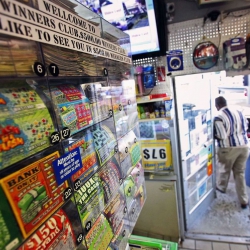South Carolina residents who bought the $1 Holiday Cash Add-A-Play ticket thought they had hit a big Christmas jackpot, but lottery officials say their ticket purchases were not valid. South Carolina Education Lottery officials said a programming error created too many winning tickets, so they suspended play and launched an investigation.
Officials have not stated how many tickets were affected, but one woman collected $18,000 in winning tickets by playing at several different venues. The top prize on the Holiday Cash Add-a-Play Ticket is $500.
One store manager said in an interview with CNN affiliate WYFF that the lottery snafu created a “frenzy” at the store, as residents learned by word-of-mouth that the stores were printing out winning lottery tickets. The manager said dozens of people “rushed in” to buy winning lottery tickets, at least before they learned that they might not be able to cash the tickets.
Holiday Cash Add-A-Play Mixup
In a Twitter announcement, the South Carolina Education Lottery said, “Holiday Cash Add-A-Play game sales and validations have been suspended until further notice. Players with tickets affected are advised to hold on to their tickets(s) until a review is completed. Updates will be provided.”
A later announcement by the lottery explained how the glitch worked. The SCEL said, “From 5:51 p.m. to 7:53 p.m., the same play symbol was repeated in all nine available play areas on tickets which would result in a top prize of $500. No more than five identical play symbols should appear for a single play.”
“As soon as the issue was identified, the Add-A-Play game was suspended immediately to conduct a thorough investigation.”
Disappointed Lottery Customers
The announcement disappointed a number of lottery customers. Nicole Coggins, a resident of Liberty, South Carolina, said she had bought enough tickets to take her children to Disney World, but those hopes are dashed.
Between her and her mother-in-law, Nicole Coggins’ family won $18,000 from the Holiday Cash Add-A-Play lottery game. Coggins told the WYFF interviewer of her Disney World plans, saying, “I had been promising them for years and I thought I would finally get to, and now I can’t.”
How the House Edge Works
Gamblers usually play while knowing they are at a disadvantage. For that reason, they have no sympathy for a gaming operator who complains they want to disallow a game, because the odds were not in their favor.
To a lottery player like Nicole Coggins, the lottery should honor its obligations, even when the game is not in its favor. Mrs. Coggins said, “We didn’t do anything wrong. The stores didn’t do anything wrong. It’s (the SCEL’s) fault. I think they should either honor the tickets or give us our money back.”
Winnings Probably Invalid
That is not likely to happen. As a general rule, in states where a certain form of gambling is legal, state laws are written to benefit gaming operators in that sector — not the gamblers. For instance, in the Phil Ivey baccarat edge-sorting case, New Jersey state law said Ivey’s $9.6 million in winnings were invalid, because the game of baccarat violated state law.
The fine print on South Carolina lottery tickets likely have similar warnings. Terms and conditions tend to state a game is invalid under certain circumstances, such as computer malfunction. Or state law might say a game is invalid when its participants know of flaws in the game. If the people who bought multiple Holiday Cash Add-A-Play tickets receive their winnings, it will be because the South Carolina Education Lottery decided to pay out in the interest of public relations.
South Carolina Eduction Lottery
Despite the term “Education” being used in the name of South Carolina’s lottery corporation, it is a business — big business. Lawmakers and lottery officials tend to play-up the idea that lottery revenues go to education and scholarship funds, but in most cases, the cash goes into the state’s General Fund. In short, it is treated like any other tax revenues in the state, so the incentive is revenue-driven.
The investigation by officials will focus on the source of the problem, to determine whether it was the result of an ordinary computer or software malfunction, or the result of tampering. The probe might see how many bad tickets were sold. In that case, if it is not too costly, South Carolina Education Lottery officials might decide it is better for PR reasons to pay the winners.
No Other Tickets Affected
Lottery officials said that the $1 holiday tickets were the only games affected. Instant scratch-off tickets and the bigger state lottery games were not affected by the glitch.

